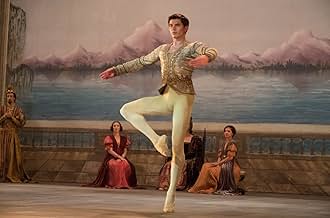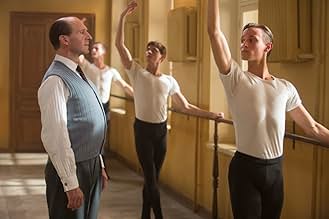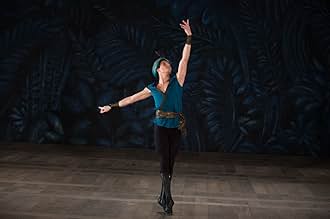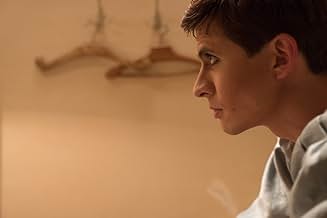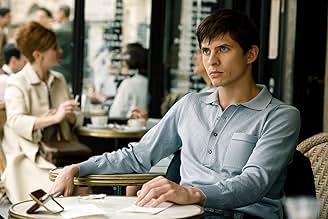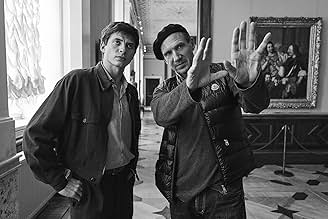CALIFICACIÓN DE IMDb
6.6/10
7.3 k
TU CALIFICACIÓN
La historia de cómo el bailarín Rudolf Nureyev desertó de la Unión Soviética por Occidente.La historia de cómo el bailarín Rudolf Nureyev desertó de la Unión Soviética por Occidente.La historia de cómo el bailarín Rudolf Nureyev desertó de la Unión Soviética por Occidente.
- Premios
- 1 premio ganado y 4 nominaciones en total
- Dirección
- Guionistas
- Todo el elenco y el equipo
- Producción, taquilla y más en IMDbPro
Opiniones destacadas
A beautiful film. But not so convincing. Correct but easy to reduce it to the last part tension. Interesting portrait of the period, expression of admiration for Nureev art, seductive ballet scenes and the hard try to convince. But, in too many parts, the film remains only a sketch. The good points - hard effort of Oleg Ivanko to create his role and to convince the viewer, the passion of Ralph Fiennes to the project, the presence of Sergei Polunin and the performance of Adele Exarchopoulos. The result is, obvious, a beautiful one . But convince it ? In few points, with indulgence in other.
Based on the life of Rudolf Nureyev (portrayed by Oleg Ivenko): in different time segments, the life of the ballet great is depicted during his childhood in rural Eastern Russia; his late teen years training in Leningrad (now St. Petersburg); and the Kirov Ballet tour in Paris of 1961 during which Nureyev made a decision that changed his life significantly. The film is based on the novel "Rudolf Nureyev: A Life" by Julie Kavanaugh and is a British/French/Serbian co-production spoken in Russian, French, and English.
One of the enjoyable aspects of the film is following the young man's transition from a rural area into cities as grand as Leningrad and Paris and his awestruck fascination with the visual arts at his disposal. This can easily remind many viewers of their first travel experiences and having felt the same elation.
The three different time sequences are done concurrently which is sometimes jarring and unnecessary. The film would probably have been better if done chronologically with only occasional flashbacks.
Around the halfway mark of the film, Nureyev is showing a lot of irritability in a restaurant scene. It is at this mark that the viewer could feel equally irritated after having had enough of the frequent timeline changes and the film's reduced energy by that point. Also in that scene, while Nureyev is showing a strong reaction to class prejudice from other Russians, there was little to indicate this problem in earlier scenes. His rudeness seems to come out of nowhere.
Despite these criticisms, it is all worth it for the extended climactic scene at Paris' Le Bourget Airport (very well re-constructed to resemble its appearance in the early 1960s). Much like the final airport scene in "Argo", the one here has suspense, tension, and mystery even if the outcome is already well known.
"The White Crow" is a fine tribute to an artistic icon and a good depiction of the life of a genius in a restrictive, Communist country although it would have benefited to explore more on another restriction in Rudolf's life under Communisim - his homosexuality. Considering the film concluded when its subject was still very young, it is tempting to encourage a sequel for the remainder of such a very unique life of an extremely rare individual who radically changed fate for his own life and that of the ballet world. - dbamateurcritic
One of the enjoyable aspects of the film is following the young man's transition from a rural area into cities as grand as Leningrad and Paris and his awestruck fascination with the visual arts at his disposal. This can easily remind many viewers of their first travel experiences and having felt the same elation.
The three different time sequences are done concurrently which is sometimes jarring and unnecessary. The film would probably have been better if done chronologically with only occasional flashbacks.
Around the halfway mark of the film, Nureyev is showing a lot of irritability in a restaurant scene. It is at this mark that the viewer could feel equally irritated after having had enough of the frequent timeline changes and the film's reduced energy by that point. Also in that scene, while Nureyev is showing a strong reaction to class prejudice from other Russians, there was little to indicate this problem in earlier scenes. His rudeness seems to come out of nowhere.
Despite these criticisms, it is all worth it for the extended climactic scene at Paris' Le Bourget Airport (very well re-constructed to resemble its appearance in the early 1960s). Much like the final airport scene in "Argo", the one here has suspense, tension, and mystery even if the outcome is already well known.
"The White Crow" is a fine tribute to an artistic icon and a good depiction of the life of a genius in a restrictive, Communist country although it would have benefited to explore more on another restriction in Rudolf's life under Communisim - his homosexuality. Considering the film concluded when its subject was still very young, it is tempting to encourage a sequel for the remainder of such a very unique life of an extremely rare individual who radically changed fate for his own life and that of the ballet world. - dbamateurcritic
A biopic about Rudolf Nureyev: gifted with an exemplary technique, he is considered as the greatest classical dancer and as one of the greatest choreographers.
The actors Oleg Ivenko and Chulpan Khamatova are excellent whereas Ralph Fiennes is magnificent with a masterful interpretation of Alexander Pushkin, with restraint and sensitivity. He literally impressed me! Nevertheless, as a director, Ralph Fiennes is less convincing. He excessively insists on the haughty and unpleasant character of Rudolf Nureyev, to such a point that we almost want to slap him. In addition, the manifold alternations between the trip to Paris in 1961 (the present time) and the flashbacks (his childhood in a poor family and his debut as a dancer) are almost disturbing. I would have appreciated that Ralph Fiennes develops these different points: 1) An evocation of the trip to Vienna in 1959, formerly Western Europe, followed by a formal ban on all abroad travel formulated by the Russian Minister of Culture, which could have explained, without justifying, the oppressive and stifling behavior of the KGB members, in Paris in 1961. 2) A less dark presentation of the Soviet Union reduced to KGB members as obtuse as omnipotent. Indeed, at the beginning of the 60s, the Soviet aura was supreme: culture, science, geopolitical influence, ... For instance, the dramatic Nureyev's defection at the Paris Le Bourget Airport happened just two months after the Bay of Pigs invasion which was a significant failure for Kennedy's US foreign policy and a strong reinforcement of the relations between Cuba and the Soviet Union.
As a synthesis, the movie is excellently interpreted but the realization is slightly muddleheaded. 6/7 of 10.
The actors Oleg Ivenko and Chulpan Khamatova are excellent whereas Ralph Fiennes is magnificent with a masterful interpretation of Alexander Pushkin, with restraint and sensitivity. He literally impressed me! Nevertheless, as a director, Ralph Fiennes is less convincing. He excessively insists on the haughty and unpleasant character of Rudolf Nureyev, to such a point that we almost want to slap him. In addition, the manifold alternations between the trip to Paris in 1961 (the present time) and the flashbacks (his childhood in a poor family and his debut as a dancer) are almost disturbing. I would have appreciated that Ralph Fiennes develops these different points: 1) An evocation of the trip to Vienna in 1959, formerly Western Europe, followed by a formal ban on all abroad travel formulated by the Russian Minister of Culture, which could have explained, without justifying, the oppressive and stifling behavior of the KGB members, in Paris in 1961. 2) A less dark presentation of the Soviet Union reduced to KGB members as obtuse as omnipotent. Indeed, at the beginning of the 60s, the Soviet aura was supreme: culture, science, geopolitical influence, ... For instance, the dramatic Nureyev's defection at the Paris Le Bourget Airport happened just two months after the Bay of Pigs invasion which was a significant failure for Kennedy's US foreign policy and a strong reinforcement of the relations between Cuba and the Soviet Union.
As a synthesis, the movie is excellently interpreted but the realization is slightly muddleheaded. 6/7 of 10.
This film tells the story of a Russian ballet dancer who defected in France during the cold war.
I can't quite believe how good this film is. The story is intense and captivating, even if you don't know about Rudi or about ballet. The dances portrayed are beautiful, the leading actors are great to look at too. The airport scene is so intense that I watched it several times. I also particularly like the fact that Clara Sant helped Rudi so much, without expecting anything in return. I enjoyed every bit of this film, and I strongly recommend it.
I can't quite believe how good this film is. The story is intense and captivating, even if you don't know about Rudi or about ballet. The dances portrayed are beautiful, the leading actors are great to look at too. The airport scene is so intense that I watched it several times. I also particularly like the fact that Clara Sant helped Rudi so much, without expecting anything in return. I enjoyed every bit of this film, and I strongly recommend it.
My wife and I watched this at home on DVD from our public library.
While the focus of this movie is the 1961 defection of ballet dancer Nureyev you can't really tell that part of his life without understanding his beginnings, from being born on a train in 1938 to studying under the demanding Soviet system. Most of that takes up the first half of the movie.
I remember Nureyev well, he was such an inventive dancer and became popular world-wide in the 1960s and 1970s but I never knew his story. When the company of dancers would tour outside the USSR they were not supposed to exchange ideas or even talk to people from other countries but Nureyev never really followed the rules. When it looked like going back home might be bad for him, in France he defected, asking for political asylum. The scenes that retell and dramatize the incident are some of the best in this movie.
For the role Oleg Ivenko, a Ukranian who really is a ballet dancer in Russia and a first-time actor, plays Rudolf Nureyev and he plays him very well.
A really well made movie and a well told story, we enjoyed it.
While the focus of this movie is the 1961 defection of ballet dancer Nureyev you can't really tell that part of his life without understanding his beginnings, from being born on a train in 1938 to studying under the demanding Soviet system. Most of that takes up the first half of the movie.
I remember Nureyev well, he was such an inventive dancer and became popular world-wide in the 1960s and 1970s but I never knew his story. When the company of dancers would tour outside the USSR they were not supposed to exchange ideas or even talk to people from other countries but Nureyev never really followed the rules. When it looked like going back home might be bad for him, in France he defected, asking for political asylum. The scenes that retell and dramatize the incident are some of the best in this movie.
For the role Oleg Ivenko, a Ukranian who really is a ballet dancer in Russia and a first-time actor, plays Rudolf Nureyev and he plays him very well.
A really well made movie and a well told story, we enjoyed it.
¿Sabías que…?
- TriviaHayden Christensen, who trained extensively in ballet as a child, was first choice to star; however a persistent ankle injury prevented him from being able to perform to the standards demanded by Ralph Fiennes.
- ErroresIn a scene showing a close up of Nureyev's foot performing a tendu, the shoe he is wearing is a white split sole ballet slipper, a shoe that did not exist in the 1960s. Split sole ballet technique shoes have only been on the dance scene since the mid 1990s.
- Citas
Claire Motte: You are with the company? Did you dance tonight?
Rudolf Nureyev: If I had danced, you would remember.
- ConexionesFeatured in Ralph Fiennes & Oleg Ivenko in Conversation (2019)
- Bandas sonorasLa Bayadère 3rd Shade Variation
Composed by Ludwig Minkus
Arranged by Matthias Gohl
Performed by Ilan Eshkeri and The London Metropolitan Orchestra
Selecciones populares
Inicia sesión para calificar y agrega a la lista de videos para obtener recomendaciones personalizadas
- How long is The White Crow?Con tecnología de Alexa
Detalles
- Fecha de lanzamiento
- Países de origen
- Sitios oficiales
- Idiomas
- También se conoce como
- Beyaz Karga
- Locaciones de filmación
- Productoras
- Ver más créditos de la compañía en IMDbPro
Taquilla
- Total en EE. UU. y Canadá
- USD 1,828,784
- Fin de semana de estreno en EE. UU. y Canadá
- USD 78,782
- 28 abr 2019
- Total a nivel mundial
- USD 7,622,595
- Tiempo de ejecución
- 2h 7min(127 min)
- Color
- Relación de aspecto
- 1.85 : 1
Contribuir a esta página
Sugiere una edición o agrega el contenido que falta






